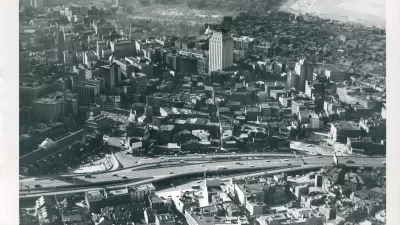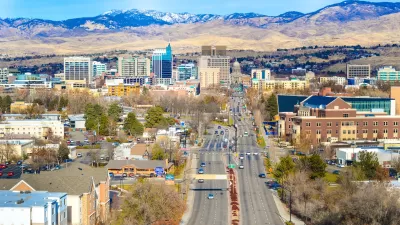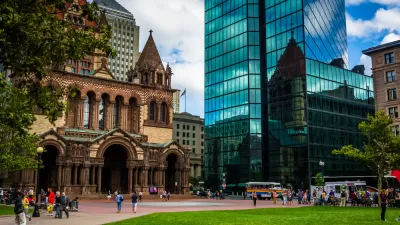Michelle Wu, Boston's new mayor, is ready to finally end the government powers that displaced communities in the mid-20th century.

In February, Boston Mayor Michelle Wu asked the City Council to end five of the city’s 14 active urban renewal plan areas, "with the goal of winding down all of the plans by the end of this year," reports Catherine Carlock for the Boston Globe.
"A powerful urban development tool granted to the then-Boston Redevelopment Authority in the late 1950s, urban renewal has been the city’s primary mechanism to take so-called 'blighted' property by eminent domain, and was key to the wholesale razing of the West End, Scollay Square, and parts of the South End and Roxbury in the 1950s and ′60s," explains Carlock.
Mayor Wu wrote a letter to the City Council explaining the rationale behind the request to end the city's urban renewal districts—connecting the contemporary urban renewal districts to their history as tools of displacement through "slum clearance" and other methods of a previous era of planning. "My administration is committed to putting equity at the forefront of planning and development decisions and the sunsetting of urban renewal in Boston should be viewed through this lens," wrote Wu in the letter.
As noted by Carlock, Wu campaigned on the issue of sunsetting the city's urban renewal districts, along with other larger structural reforms for the Boston Planning and Development Agency, so stay tuned for more reform developments.
FULL STORY: Wu says she’ll wind down Boston’s urban renewal districts. Here’s what that means.

Study: Maui’s Plan to Convert Vacation Rentals to Long-Term Housing Could Cause Nearly $1 Billion Economic Loss
The plan would reduce visitor accommodation by 25,% resulting in 1,900 jobs lost.

North Texas Transit Leaders Tout Benefits of TOD for Growing Region
At a summit focused on transit-oriented development, policymakers discussed how North Texas’ expanded light rail system can serve as a tool for economic growth.

Using Old Oil and Gas Wells for Green Energy Storage
Penn State researchers have found that repurposing abandoned oil and gas wells for geothermal-assisted compressed-air energy storage can boost efficiency, reduce environmental risks, and support clean energy and job transitions.

Private Donations Propel Early Restoration of Palisades Playground
Los Angeles has secured over $1.3 million in private funding to restore the Pacific Palisades playground months ahead of schedule, creating a modern, accessible space that supports community healing after recent wildfires.

From Blight to Benefit: Early Results From California’s Equitable Cleanup Program
The Equitable Community Revitalization Grant (ECRG) program is reshaping brownfield redevelopment by prioritizing projects in low-income and environmental justice communities, emphasizing equity, transparency, and community benefits.

Planting Relief: Tackling Las Vegas Heat One Tree at a Time
Nevada Plants, a Las Vegas-based nonprofit, is combating the city’s extreme urban heat by giving away trees to residents in underserved neighborhoods, promoting shade, sustainability, and community health.
Urban Design for Planners 1: Software Tools
This six-course series explores essential urban design concepts using open source software and equips planners with the tools they need to participate fully in the urban design process.
Planning for Universal Design
Learn the tools for implementing Universal Design in planning regulations.
Ascent Environmental
Borough of Carlisle
Institute for Housing and Urban Development Studies (IHS)
City of Grandview
Harvard GSD Executive Education
Toledo-Lucas County Plan Commissions
Salt Lake City
NYU Wagner Graduate School of Public Service





























